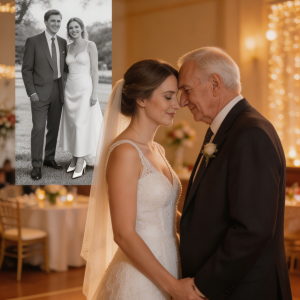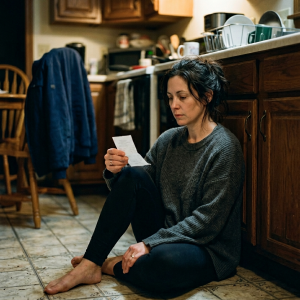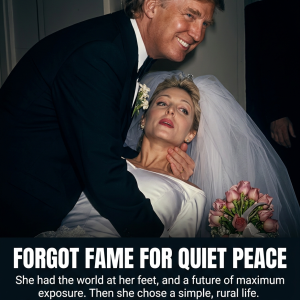Six months after my divorce, when life still felt like a series of open wounds, we met Tank.
He was sitting quietly in the corner of the shelter—massive, muscular, and labeled “unadoptable.” The staff said he was too strong, too intimidating, not good for families. But I saw something different. When someone raised their voice nearby, Tank flinched. And when my five-year-old daughter, Leila, tiptoed up to his kennel, he didn’t bark or growl—he simply sat, quietly watching her with the saddest eyes I’d ever seen.
While others passed him by, we took him home.
Leila had struggled with sleep since the divorce. Nightmares, bedwetting, and heartbreaking cries in the middle of the night became our new normal. We tried therapy, white noise machines, stuffed animals—nothing helped.
Until one night.
Tank had fallen asleep on the couch, sprawled out like a snoring bear. Leila climbed up beside him, tucked herself into the crook of his body, and whispered, “Don’t worry—I get bad dreams too.” He didn’t budge, just stayed beside her.
That night, she slept soundly. No crying. No waking. Just peace.
From then on, she called him her “dream bouncer.” She believed Tank stood guard at the door of her dreams, scaring off the bad ones. And somehow, he did.
But good things always seem to face a challenge.
One day, a neighbor complained. Said her child was afraid of Tank. Management got involved, clipboard and all, and handed us an ultimatum: either get rid of the dog or leave the apartment.
I looked at Tank—snuggled on the couch, Leila’s hand resting gently on his ear—and I knew one thing:
We weren’t giving up without a fight.
The next morning, I started calling around. Friends who knew housing laws. Local shelters. Tenant advocacy groups. Marcy from a shelter downtown gave me the best advice: gather signatures. Show the building that Tank wasn’t a threat—he was family.
So I did. Clipboard in hand, I knocked on every door.
Some people hesitated—rumors had spread—but others had seen Tank’s real side. Mrs. Patel from 3B smiled as she told me how he once nudged her spilled groceries back to her, eggs unharmed. Mr. Alvarez remembered Leila’s laughter as she walked Tank in the courtyard. By sunset, I had dozens of signatures.
Leila, ever his biggest advocate, drew pictures of Tank chasing monsters away from her bed. “He’s big,” she’d tell people proudly, “but only the bad guys are scared of him.”
I was proud. But I was scared, too. What if it wasn’t enough? What if Tank had to go back? Or worse?
Then came another letter. Management wasn’t swayed. We had seven days to remove Tank or vacate.
I read the letter aloud, and Leila broke into tears. “No! They can’t take him! He’s part of our family!” I held her tightly, my own fear rising. “I promise—we’ll figure this out.”
That evening, something unexpected happened.
Tank got up, alert, and walked to the front door. Moments later, a knock.
It was Greg from downstairs, holding a thick stack of papers.
“Figured you could use these,” he said. Inside were testimonials—from parents whose kids played around Tank, from elderly residents who appreciated his calm demeanor, and even one from the maintenance guy who fixed our leaky sink.
“He’s a good boy,” Greg said, and left.
Hope returned.
On the sixth day, I walked into the management office carrying the petition, testimonials, photos of Tank with Leila and neighborhood kids, and even a note from Leila’s therapist.
Ms. Harper, the property manager, skimmed through them.
“I understand,” she said, “but policies are policies.”
“Policies are there to protect people,” I said. “And Tank is protecting someone. My daughter. He’s not a threat—he’s a healer.”
She hesitated. “And if another complaint comes in?”
“I’ll take full responsibility. But I promise—it won’t.”
After a long pause, she finally nodded. “You’ve got thirty days. We’ll reevaluate then.”
Thirty days. A small window—but a chance.
Over that month, everything changed.
Neighbors stopped to greet us. Some brought treats for Tank. Kids came by to pet him. Even Ms. Harper dropped by unexpectedly—and saw Tank resting calmly as Leila read beside him.
One afternoon, Leila burst through the door beaming. “Mom! My teacher says Tank should get a medal!”
“For what?” I laughed.
“For protecting dreams!” she grinned.
And maybe she was right. Tank wasn’t just her hero—he’d become a quiet symbol of hope for anyone willing to look past his size.
At the end of our trial period, I returned to management with even more signatures, stories, and kind words. Ms. Harper looked at me, then around the room.
“Any concerns?” she asked.
Silence.
“Well then,” she said. “I suppose he can stay.”
The weight that lifted in that moment is hard to describe. We weren’t just allowed to stay—we had been seen.
Today, Leila sleeps soundly with Tank curled up beside her. She’s made friends. She smiles more. Tank, once the “unadoptable” dog, is now a local legend. Someone even painted a mural of him at the neighborhood café: “Tank—Dream Bouncer Extraordinaire.”
One evening, as the sun dipped behind the buildings, Leila snuggled beside me on the balcony.
“Mom, remember when they wanted to take Tank away?”
“I remember,” I said, smiling.
“They didn’t understand then. But now they know. Sometimes, the scariest-looking things are the best protectors.”
And she was right.
This wasn’t just about a dog. It was about giving someone—or something—a chance, even when the world tells you not to. About holding your ground when it matters most. About kindness, loyalty, and fierce love wrapped in fur and muscle.
So if you’re reading this and fighting for your own “Tank”—don’t stop.
The world may see a threat. But you know the truth.
And that truth? It’s worth everything.





